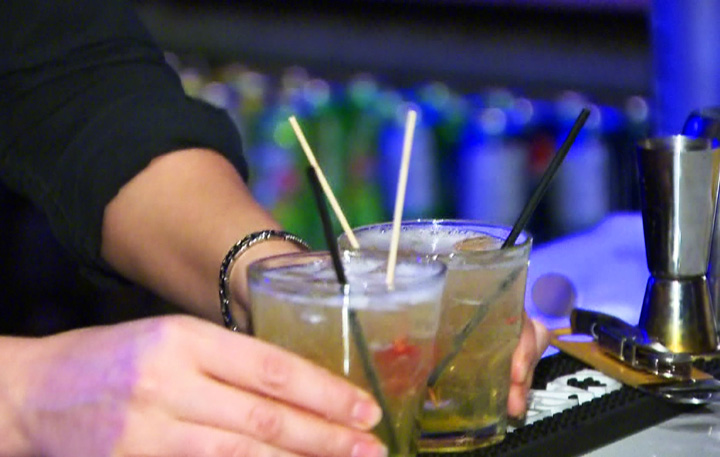TORONTO – ‘Tis the season of the office holiday party, a time when the combination of awkward mingling with co-workers plus alcohol creates a social minefield.

But, experts say, one faux pas can easily turn bad behaviour into a legal mess.
As the Christmas/holiday/end-of-year party season kicks off, employment law experts offer some tips on how both employers and employees can avoid liability while still partaking in some holiday cheer.
Don’t offer alcohol
Having an alcohol-free event is the best way to minimize risk for employers, though it isn’t always a popular solution, says employment lawyer Inna Koldorf.
Court records are filled with examples of people sexually harassing co-workers and making inappropriate or racist comments at parties. Alcohol is often involved.
Then there is perhaps the biggest concern any time alcohol is served, that an employee will drive home drunk after the party and hurt or even kill someone.
A 2006 decision from the Supreme Court of Canada found that social party hosts were not liable in that situation, Koldorf says.
But she warns that could be different for hosts who are employers.
“They do have an obligation to keep employees safe while they’re at work and there is more of a relationship of supervision and control than between a host and a guest,” she says.
Hold your party off-site
If a holiday party is held at a licensed restaurant, for example, the restaurant would be considered the provider of alcohol and therefore would assume more of the responsibility for cutting someone off when they’ve had too much to drink, says employment lawyer Daniel Iny.
But some liability could still exist for the employer, he says.
“I would think an employer still has some obligation to take steps if an employer knows an employee…is visibly intoxicated, for example, and not in a position to drive home, the employer can’t turn a blind eye,” he says.
Don’t provide open access to alcohol
If the party is in the office, or somewhere outside a licensed establishment, hire someone to serve alcohol, Koldorf says.
“(It) typically causes employees to drink a little less and if those individuals are trained then they can actually flag individuals who are intoxicated and who have had too much to drink and they can actually stop serving them,” she says.
Hold a lunch or breakfast party
At Iny’s firm the holiday party every year is a lunch from 12 to 4. Common sense dictates that daytime parties discourage heavy drinking or pre-drinking.
Some employers hold active events such as skiing parties or rock climbing parties, says Koldorf.
“Don’t serve any alcohol during the active part of the party,” she says. “It sounds like something that anyone should think about, but some people don’t.”
Have a plan for employees who have had too much to drink
“Offer either somewhere to stay for the evening or transportation to and from the event so people don’t feel compelled to get back in their car after the event and drive themselves home,” Koldorf says.
She recommends employers offer taxi chits and/or book a few hotel rooms nearby in case people need to spend the night.
Invite spouses or families
Aside from excessive drinking, the most common problem scenario that likely arises from office holiday parties is sexual harassment, says Iny, though he concedes the two are not mutually exclusive.
“I think it’s kind of well settled that the incidents of sexual harassment claims are dramatically diminished at holiday parties and the like when spouses are included,” he says.
Employees are still bound by workplace policies, even at after-hours parties
“I don’t think a holiday party gives an employee carte blanche to do or say things that would never be tolerated in the workplace, nor does it give an employer the same right,” says Iny.
“If it’s an employment event…an employee can be disciplined in my view for conduct that occurs at a holiday party.”
Koldorf says the best bet is to conduct yourself as if you were at work.
“It’s not like they’re watching their every move, but management is watching their behaviour,” Koldorf says. “There have been incidents in the past where employees have done some outrageous things that did not comply with the employers’ policies or the workplace policies and they were disciplined.”
Cautionary tales
The Human Rights Tribunal of Ontario in 2011 upheld the dismissal of an employee at a plastics company after he got drunk at the company Christmas party and harassed his supervisors and made sexually inappropriate comments and physical threats to his fellow employees and their spouses. He tried to appeal because he argued the company should have known he was an alcoholic and accomodated his disability.
Earlier this year the Workplace Safety and Insurance Appeals Tribunal ruled that a man was in the course of his employment when he got drunk at his company’s holiday party, fell on the dance floor and fractured his shoulder. The tribunal found that even though attendance at the party was voluntary, the employer sponsored and organized the event where alcohol was provided as well as free hotel rooms “on the presumed understanding that workers would be likely to consume alcohol to excess.”
A senior manager at a hotel chain went to British Columbia’s Supreme Court claiming damages for wrongful dismissal stemming from his behaviour at the company holiday party. But the court, in a 2009 decision, dismissed his claim, ruling that his sexual harassment of a junior employee and his dishonesty during the investigation of her complaint was “fundamentally inconsistent with the continuation of the employment relationship.”





Comments